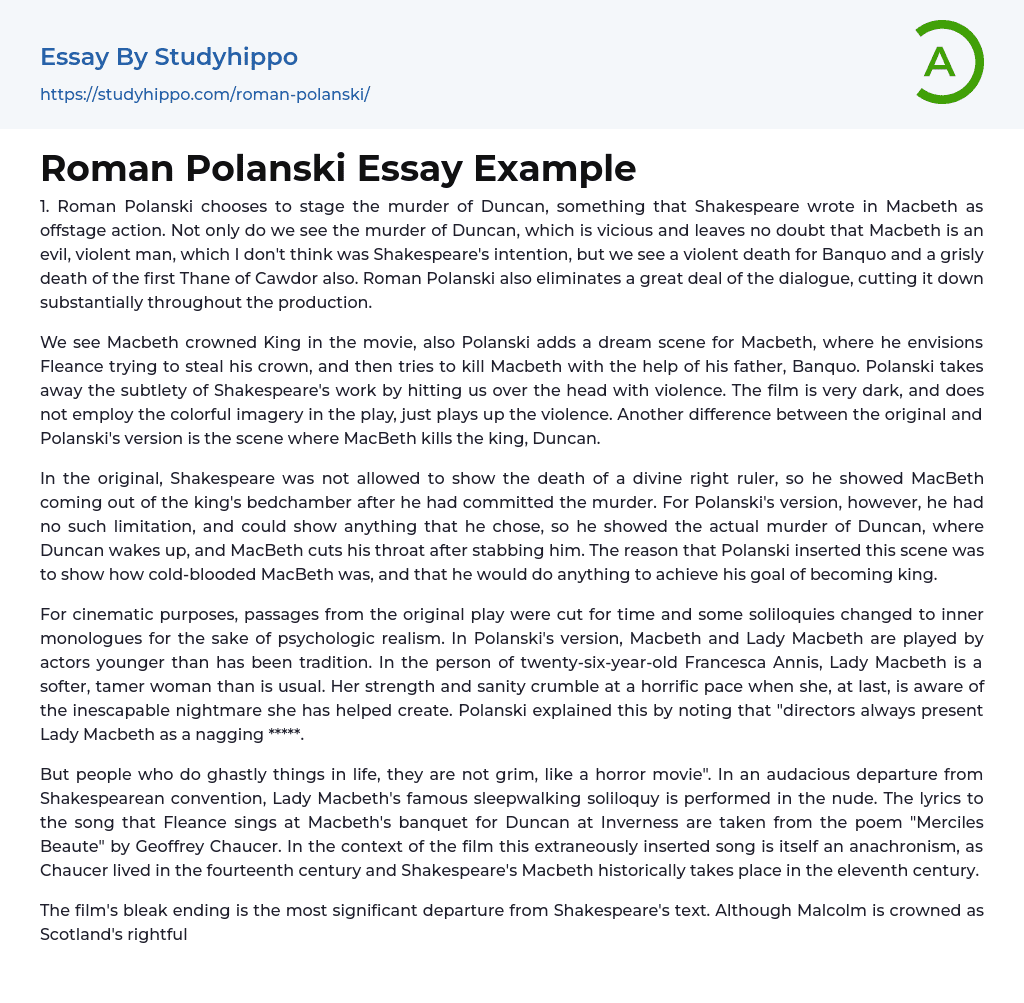1. Roman Polanski chooses to stage the murder of Duncan, something that Shakespeare wrote in Macbeth as offstage action. Not only do we see the murder of Duncan, which is vicious and leaves no doubt that Macbeth is an evil, violent man, which I don't think was Shakespeare's intention, but we see a violent death for Banquo and a grisly death of the first Thane of Cawdor also. Roman Polanski also eliminates a great deal of the dialogue, cutting it down substantially throughout the production.
We see Macbeth crowned King in the movie, also Polanski adds a dream scene for Macbeth, where he envisions Fleance trying to steal his crown, and then tries to kill Macbeth with the help of his father, Banquo. Polanski takes away the subtlety of Shakespeare's work by hitting us over the head with viol
...ence. The film is very dark, and does not employ the colorful imagery in the play, just plays up the violence. Another difference between the original and Polanski's version is the scene where MacBeth kills the king, Duncan.
In the original, Shakespeare was not allowed to show the death of a divine right ruler, so he showed MacBeth coming out of the king's bedchamber after he had committed the murder. For Polanski's version, however, he had no such limitation, and could show anything that he chose, so he showed the actual murder of Duncan, where Duncan wakes up, and MacBeth cuts his throat after stabbing him. The reason that Polanski inserted this scene was to show how cold-blooded MacBeth was, and that he would do anything to achieve his goal of becoming king.
For cinematic purposes,
passages from the original play were cut for time and some soliloquies changed to inner monologues for the sake of psychologic realism. In Polanski's version, Macbeth and Lady Macbeth are played by actors younger than has been tradition. In the person of twenty-six-year-old Francesca Annis, Lady Macbeth is a softer, tamer woman than is usual. Her strength and sanity crumble at a horrific pace when she, at last, is aware of the inescapable nightmare she has helped create. Polanski explained this by noting that "directors always present Lady Macbeth as a nagging *****.
But people who do ghastly things in life, they are not grim, like a horror movie". In an audacious departure from Shakespearean convention, Lady Macbeth's famous sleepwalking soliloquy is performed in the nude. The lyrics to the song that Fleance sings at Macbeth's banquet for Duncan at Inverness are taken from the poem "Merciles Beaute" by Geoffrey Chaucer. In the context of the film this extraneously inserted song is itself an anachronism, as Chaucer lived in the fourteenth century and Shakespeare's Macbeth historically takes place in the eleventh century.
The film's bleak ending is the most significant departure from Shakespeare's text. Although Malcolm is crowned as Scotland's rightful king, his concluding speech is omitted in favour of an abrupt, wordless scene showing his brother, Donalbain, returning from exile and entering the witches' lair, implying that he will seek their counsel in usurping King Malcolm as Macbeth usurped King Duncan, thus re-cycling internecine bloodshed. Throughout the story, Donalbain is shown as envious of Malcolm, perhaps even more than was Macbeth.
The ending recasts the story as a closed circuit of action suggesting that
the tragedy will be repeated ad infinitum. It may explain Fleance's founding of the House of Stuart, the extinction of Duncan's line, and the historical fact of Donalbain's ultimate betrayal of his brother, King Malcolm of Scotland. The sub-plot about the English installation of Malcolm to the Scots throne is downplayed to an extent not in the original work.
This is Shakespeare's implication that Fleance is the ancestor of the contemporary King James, his benefactor. Compared to other cinematic adaptations of The Tragedy of Macbeth, the bluntly explicit violence shows Macbeth in a historical light, rather than a dramatised regicide. Nevertheless, the attitude of Polanski's Macbeth is consistent with the whole of his concern with the unstable dynamics of power and sexuality and the cynic's questioning of conventional notions of heroism and redemptive action.
- Banquo essays
- Macbeth Ambition essays
- John Locke essays
- 9/11 essays
- A Good Teacher essays
- A Healthy Diet essays
- A Modest Proposal essays
- A&P essays
- Academic Achievement essays
- Achievement essays
- Achieving goals essays
- Admission essays
- Advantages And Disadvantages Of Internet essays
- Alcoholic drinks essays
- Ammonia essays
- Analytical essays
- Ancient Olympic Games essays
- APA essays
- Arabian Peninsula essays
- Argument essays
- Argumentative essays
- Art essays
- Atlantic Ocean essays
- Auto-ethnography essays
- Autobiography essays
- Ballad essays
- Batman essays
- Binge Eating essays
- Black Power Movement essays
- Blogger essays
- Body Mass Index essays
- Book I Want a Wife essays
- Boycott essays
- Breastfeeding essays
- Bulimia Nervosa essays
- Business essays
- Business Process essays
- Canterbury essays
- Carbonate essays
- Catalina de Erauso essays
- Cause and Effect essays
- Cesar Chavez essays
- Character Analysis essays
- Chemical Compound essays
- Chemical Element essays
- Chemical Substance essays
- Cherokee essays
- Cherry essays
- Childhood Obesity essays
- Chlorine essays




